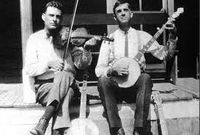Annotation:Lost John
X:1 T:Lost John M:2/4 L:1/16 R:Song and Reel N:This is Rutherford's fiddle break S:Burnett & Rutherford B:Kuntz - Ragged But Right (1986) Z:AK/Fiddler's Companion K:G zDGB||d2>B2 d4-|d4-dDGA|(B2<A2G4)-|G6 zE| DEGA BAGA|DGB2 [G3B3]G|DEGA BAGA|BGA2 G2de| d2>e2 d4-|d4 zDEG|B2>A2 G4-|G4 zDGB| [B3d3]e [B4d4]-|[B4d4] zDEG|B2>A2 G4-|G6||
LOST JOHN. AKA and see "Lost Boy Blues." Old-Time, Bluegrass; Breakdown and Song. USA; Alabama, Mississippi, Tennessee, Kentucky. G Major. Standard tuning (fiddle). AB (Phillips): AAB (Brody, Kuntz). Mark Wilson reports that folklorist/musicologist Alan Lomax links these songs (plural, for there are several tunes which use this floating title) to antebellum folklore about the character of John the Trickster Slave. Charles Wolfe remarks that the family of songs has several branches, including the old-timey 'hillbilly' song, a blues harmonica solo version by De Ford Bailey (Victor, 1920's), a vaudeville song ("Lost John Dean from Bowling Green"), and a work song "Wake Up, Dead Man"). Tom Rankin (1985) differentiates the different melodies using the title: Enos Canoy, Burnett and Rutherford, Henry Whitter, De Ford Bailey, Palmer McAbee and Oliver Sims' (the latter four are harmonica versions. Enos Canoy originally learned the tune on the harmonica and transferred it to the fiddle). The tune was recorded by the Northwest Alabamian (Fayette) of August 29, 1929, as likely to be played at an upcoming fiddlers' convention (Cauthen, 1990).

The song has an interesting history, and was perhaps an elaboration of an actual event; for more see the discussion on Mudcat [1] (2002). Lyrics vary. Burnett and Rutherford sing:
The funniest man I ever seen
Was Lost John goin' through Bowling Green;
No hat on his head, no shoes on his feet,
Begging the women for something to eat.
REFRAIN:
Long gone, long gone.
Lost John sittin' on a railroad track,
Waiting for the freight train to come back;
Freight train come, never made no stop,
You ought to seen Lost John gettin' on top.
Had an old dog and his name was Will,
Run Lost John to the top of the hill;
Ain't caought Lost John and he never will,
xxxxxxxxxxxxxxxxxxxxxxxxxxxxxxxxxxxxx.
John's barefoot when he left his home,
He outrun a message on the telephone;
Along come a passenger a-skippin' and a-flyin',
Missed the cowcatcher but he caught the blind.
And from Sam McGee:
Long John went to the balley (ballet) show, (Uncle Dave Macon sings 'burlesque show')
Got him a seat right in the front row.
The girls come out to do the buck-and-wing dance,
They had to carry him home in an ambulance.

